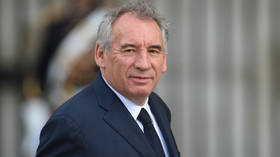Friday's Russian Press Review

This Friday Russian newspapers publish reports on President Dmitry Medvedev’s visit to Kamchatka, evaluations of the near future of Russia’s oil industry and the possibility of outward expansion of Russian capital. There are also analytical articles, two
KOMMERSANT reports from President Dmitry Medvedev’s meeting with the crew of the Russian nuclear submarine ‘St. George, The Victory Bearer’ on board the ship at the submarine base in Viliuchinsk. The paper says the officers and sailors were most interested in the continuation of the re-organization of the armed forces. The President, writes the paper, answered their worries with a firm assurance that the re-organization will be continued, and that it doesn’t depend in any way on the fluctuations caused in the economy by the World financial crisis. The paper says the President emphasized three main elements of the re-organization: the modernization of the armed forces, the uplifting of the social status of a serviceman (including a significant increase in financial remuneration), and achieving better standards of living quarters, living conditions as well as providing a better social package for servicemen.
IZVESITA reports on the speech delivered by the U.S. Secretary of Defense Robert Gates at the U.S. Senate in which the Secretary said that America should cooperate with Russia more and closer to continue its operation in Afghanistan successfully. The paper writes that this speech has become another confirmation of the new trend: it is the U.S. military who says more and more often that U.S. co-operation with Russia must not become a hostage to politics.
VEDOMOSTI writes that after Presidential Advisor Arkadi Dvorkovich suggested that at the moment Russia has a unique chance to emerge from the World financial crisis a stronger nation by expanding Russia’s investment in Western businesses, a discussion sprung up, if it would be feasible or not to invest in the devaluating stock of some Western financial institutions and other enterprises. The paper quotes Dvorkovich as saying: ‘There will always be a lot of money in Russia’ and elaborating that the State is prepared to support such an expansion by both financial and diplomatic means. Not many among business analysts agree that this approach will work in the U. S. For instance, continues the paper, Harry Hafbauer of the Washington-based Institute of World Economy is convinced that any Russian investment today, with the crisis in South Ossetia and Georgia in the very recent past, will draw attention of the U.S. Congress and Committee on Foreign Investment. Especially if the investment will amount to a take-over, adds the newspaper.
NEZAVISIMAYA GAZETA analyses the latest trend in the oil industry of Russia: the oil producing companies are reducing their output in spite of the measures taken by the government, including tax incentives. The paper quotes experts saying that World oil prices are dropping while the financial crisis makes short-term borrowing difficult and expensive. That combined creates a situation when the incentives, even the lowering of export duties, do not cover the losses of oil producers. However, says the paper, Russia’s total oil output in 2008 may drop by mere 2% compared with last year’s figure while next year it may even rise. That will happen because the newly-opened wells will reach their full capacity while the effect of today’s reduction in investment will only show in 2010-2011, says the paper.
The same paper publishes an article by Adjar Kurtov of the Russian Institute of Strategic Studies. Under the title ‘The Battle For Central Asia Is Still Ahead’ he writes that the first decade of the new century has shown clearly that the World after the Cold War has not shifted towards conflict-less cooperation of nations under the banner of common humanitarian values. He says, what is now seen on the World map and in everyday news is nothing but struggle among the World’s great powers, each of which is in pursuit of its own separate egoistic national interest. The academic suggests that after the Balkans and the Caucasus, Central Asia is going to become the next ‘battlefield’ in the conflict of the Big Players. Kurtov says, Central Asia is attractive not just because it possesses thousands of times more mineral resources than Kosovo and Georgia combined, but because geographically and politically it can unite or divide such powers around it as Russia, China and the Moslem civilization represented by a multitude of nations to the South of it. Consolidation of these powers at this moment in History will inevitably be anti-American and anti-Western, says the analyst. He continues to say that Russia as a World power has recently stopped its retreat from the region and started advancing again. Even if sometimes it resorted to the tactic of letting China in where U.S. advance was anticipated, that still served Russia’s interest: for Russia it is always easier to find common ground with China which, unlike America, has nothing against Russia’s domination in Central Asia. The academic raises a question: if Russia itself is ready to dominate in the region? He says, while increasing the efforts in building military and economic alliances Russia should not forget that its cultural advance in the region may well yield results that would be not less important.
ROSSIYSKAYA GAZETA has an article by Sergei Karaganov who analyses the outcome of the crisis in Georgia and South Ossetia for the World. He says, in the Caucasus Russia won not only militarily but politically as well. It showed to the World that it has the political will to defend its interest and the lives of its citizens. The ‘Old West’, meaning the U.S., Great Britain and their East European allies, has lost. The trend, writes Karaganov, started before the events in South Ossetia: African nations solved the problem of Zimbabwe without the ‘Old West’s help. They start making political deals without the U.S. participation in the Middle East. Turkey, a loyal NATO member, had its own policy for the conflict in the Caucasus. The energetic diplomacy by Nicholas Sarkozy won a victory for Europe: the EU has played a role of a fully responsible mediator in a major conflict. That is also good for Russia: it’s a victory by a strong competitor of the U.S. And a competitor of a competitor is a potential partner or even ally. However, says Karaganov, the first reaction by the U.S. and Europe at the early stage of the conflict – a very unfair reaction at that – has caused a kind of alienation of the most of Russia’s elite from the West, including Europe. The academic considers that to be a problem for Russia which has been fuelling its modernization for the past 300 years by a wish ‘to live like in Europe’ and on European examples. He says, it may be possible that the more far-sighted among the U.S. politicians are intentionally trying to bring Russia and the West to a new Cold War and a new arms race in order to block Russia’s further modernization. He writes that the situation in the world today is more and more resembling the years before WW I. In this light, he says, the idea of some U.S. politicians to go back to negotiations on total nuclear disarmament looks really pathetic. The first, nuclear weapon-less part of the XX Century gave us two World wars. The second, nuclear part, only gave us the Cold war which never became ‘hot’ just because the nukes were there to ‘civilize’ the conflict.
Evgeny Belenkiy, RT.












